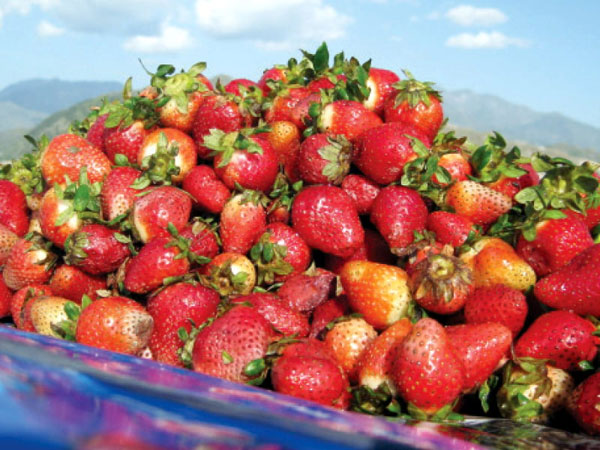 Seemed upset by an unseasonal torrential rains in Khyber Pakhtunkhwa, Mirjan Khan, a 45-year-old progressive farmer was working against the clock on Saturday to complete plucking of strawberry in his five acres agriculture land to avoid financial losses following forecast of more rainfall in Charsadda district.
Seemed upset by an unseasonal torrential rains in Khyber Pakhtunkhwa, Mirjan Khan, a 45-year-old progressive farmer was working against the clock on Saturday to complete plucking of strawberry in his five acres agriculture land to avoid financial losses following forecast of more rainfall in Charsadda district.
Engaged six extra labourers to complete strawberry’s harvest at his hometown Nisatta here, the poor farmer personally participated in its plucking in his farmland near Islamabad-Peshawar Motorway to avoid further rains damages to the crop. “The unseasonal torrential rains occured this month has negatively impacted the strawberry besides resulted arrival of the mouthwatering food in the market last, and incured substantial financial losses to its growers in Charsadda, Mardan, Nowshera and Swat,” Marjan who sent two loads pick ups to the lucrative market of Peshawar on Saturday told APP.
“This year, the strawberry market is relatively small as the crop has been damaged by the recent torrential rainfall and flash flooding in Rivers Khayali, Kabul and Shah Alam, forcing many farmers to make its pre-mature plucking in Charsadda,” he said.
“Many farmers started strawberry cultivation late in November last, expecting that the spring rains will not impact the crop but the April’s rainfalls tarnished their dreams,” he said.
He said since the strwabary crop is less in Charsadda this season due to rains damages, the retailers may sell at high prices but for farmers, there won’t be more profit due to increase in its mortality.
“There are around 100 farmers cultivating strawberries in Nesatta. At least 75% of strawberries produced in KP comes from Charsadda, Mardan, Swabi, Malakand and Hazara divisions while the remaining 25% come from others districts of Khyber Pakthunkhwa and Punjab,” he said. He said many wholesalers were reluctant to sell strawberries because the quality of the fruit affected by the unseasonal rain, resulting financial losses to locals growers.
Director General, Agriculture Research KP Abdul Bari said the recent climate change induced weather patterns have made negative effects on the production of strawberry crop in Khyber Pakhtunkhwa.
He said that waterlogged lands were not suited for cultivation of strawberries, adding this season strawberries’ arrival was also late due to climate change weather patterns.
He said that normally cultivation of strawberries began in October but the crop starts to bear fruit around January- February, adding delay in its cultivation has negatively impacted its production.
He said Charsadda, Mardan, Swabi, Nowshera, Swat, Abbottabad, Mansehra of KP, Punjab’s Sialkot, Gujranwala, Lahore, Khushab, Sargodha, Faisalabad, Jhang, Sahiwal, Multan, Bahawalpur, Rahim Yar Khan and their adjoining areas are ideal for cultivating of strawberries due to its fertile soil and better climate condition.
He said its seeds are mainly procured from Swat, Pashin, Charsadda, Mardan and are available at Rs 1.0-1.5 per plant, adding a single plant provides about 0.5 kilograms of fruit while approximately 800 maunds of produce are obtained from one acre.
However, some farmers are able to harvest 1,200 maunds per acre after proper care and fertilizers.
A farmer can earn Rs. 250979 from one acre strawberry and its returns are more than double against the cost incurred.
The chandler strawberries are very successful in Pakistan and If an adequate amount of animals waste along fertilizer is given to the plant, the harvest will be sweet with more production.
Pakistan economic woes can be addressed by promoting commercial cultivation of strawberries.
Dr Riaz Malik, senior medical specialst Govt Hospital Pabbi Nowshera said that apart from tantalising taste buds, strawberries are also an excellent source of vitamin C, adding 100 grammes of strawberries contain 52 milligrammes of vitamin C which is higher when compared with other fruits.
He said strawberries can also be used to make various jams, jellies and preserves. The increase in production will not only increase exports but will also have a positive impact on businesses selling jams, jellies and preserves.
He advised people to include strawberries in their diets for a healthy life.
Dr Abdul Bari said that trainings were provided at agriculture institutes to strawberry farmers on dip irrigation and other techniques and its protection from seasonal plants attacks besides torrential rains.